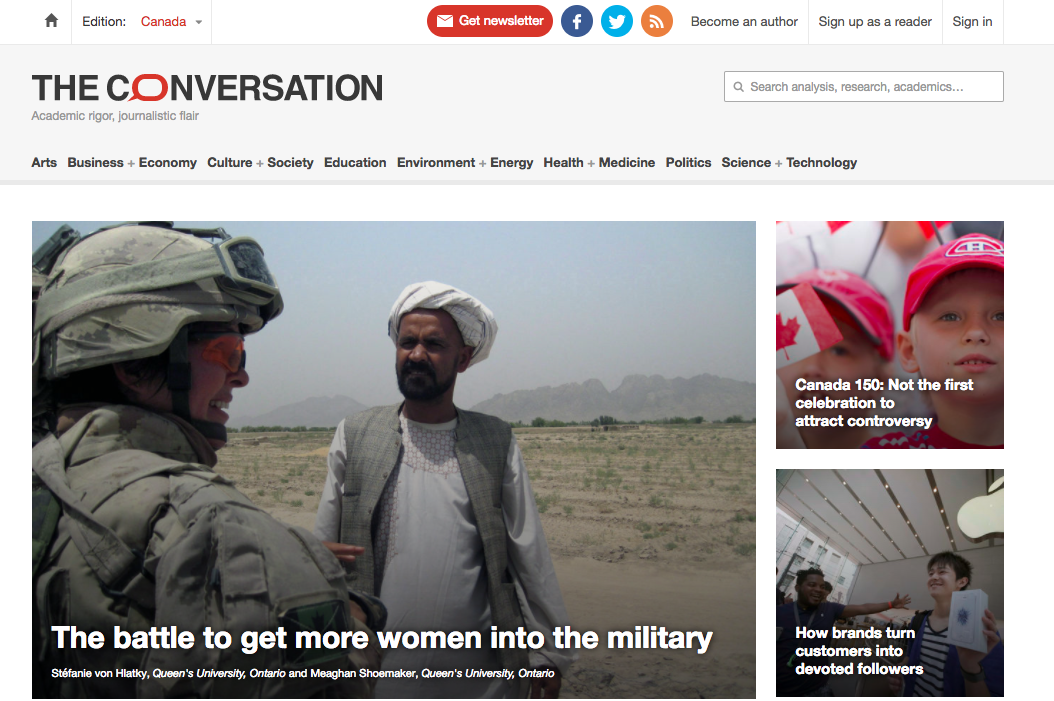It’s time to start The Conversation in Canada
By Mary-Lynn Young and Alfred Hermida for The Conversation Canada
The launch of The Conversation Canada is an opportunity to contribute to the quality of explanatory journalism in this country — and the promise such journalism holds for democratic engagement, informed policy and media innovation.
It brings academics and experienced journalists together to share timely analysis and commentary drawing from research, evidence and insights generated by Canadian universities.
We know that research can contribute to our understanding of today’s most pressing local, national and global concerns.
As a new national non-profit organization, The Conversation Canada demonstrates continued momentum for fresh ways to fund journalism. It adds to the growing list — early counts indicate at least 20 — of non-profit to semi-non-profit, foundation or university-based journalism organizations in Canada, according to a study by our UBC colleague, journalism professor Taylor Owen.
We are among an increasing number of institutional entrepreneurs experimenting with and reworking what journalism can and should do in this country.
This process involves recognizing that past forms and ways of being a journalist need to be disrupted and re-oriented for diverse audiences and changing technologies, and to address the continuing impact of what media economics scholar Robert Picard has called Canada’s “extraordinary consolidation of news enterprises.”
Circulation of ideas
For The Conversation Canada, part of the disruption lies in reshaping the role of the journalist as an editor/curator for academic contributors. This is important because universities and scholars have emerged as trusted sources of expertise globally.
Yet a significant portion of scholarly knowledge remains relatively hidden in expensive journals and is more often than not written for academic peers, rather than for a broad public.
The Conversation model is based on fostering the broadest circulation of content and amplifying the impact of ideas and research. All articles are free to republish by the media. The site is not just a destination but serves as a distribution hub for academic knowledge.
The innovation also lies in the funding model. Many new journalism non-profits have a mix of backing because it is such a challenging space. Similar to the early co-operative days of The Canadian Press, The Conversation Canada is based on a membership model. It has received funding from 17 Canadian universities, foundations, federal research funding, and a research institute.
As journalists who later took up positions as academics at a research university, we became intrigued by The Conversation model when we heard about its 2011 launch in Australia.
Founded by veteran editor Andrew Jaspan, the model is based on a partnership between academics and journalists that creates quality explanatory journalism free for anyone to share and republish. Researchers write in their field of expertise, and are edited by professional journalists to make independent, evidence-based contributions to the media.
Journey to launch
It has taken more than two years to bring this project to launch and pilot the service over the summer. We first raised it as a possibility in meetings with Stephen Toope, while he was president of the University of British Columbia, and was exploring how to transform the communications environment at the university.
These discussions led us to apply for funding from the Social Sciences and Humanities Research Council in 2015 to explore the demand and viability for a Canadian version of The Conversation global network of sites. The network includes five other sites in Australia, France, South Africa, the U.K., and the U.S., with a combined monthly audience of five million users and reach of 35 million through Creative Commons republication.
All of this led to the two big ideas in launching The Conversation Canada.
The first is to transform academic knowledge sharing and advance the quality of journalism in Canada by creating an independent and sustainable way to support researchers’ capacity to do explanatory journalism.
The second is to maximize the digital sharing of scholarly expertise. The Conversation model encourages open source values and collaboration in the university sector, amplifying the national and global impact of Canadian research.
These ideas come out of our ongoing research agenda on journalistic practices, media innovation and emerging technologies. From our perspective, The Conversation Canada provides a lab to investigate and interrogate new approaches to journalism.
This story was originally published on The Conversation, and is republished here with the authors permission.




